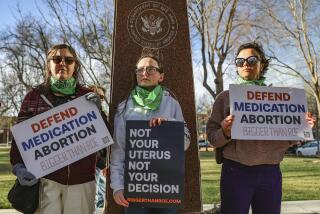FDA Advisors OK Disputed Pain Relievers
- Share via
WASHINGTON — A Food and Drug Administration advisory panel voted Friday to let doctors prescribe Cox-2 painkillers, including Celebrex and Vioxx, but recommended stronger warnings about the risk of heart attacks and strokes.
Doctors, scientists and other experts on the 32-member panel overwhelmingly agreed that Cox-2 inhibitors -- hailed as a breakthrough in treating severe arthritis pain when they first won FDA approval -- all significantly increased the risk of cardiovascular problems in patients.
The panel proposed that Celebrex, Vioxx and Bextra, the third Cox-2 drug cleared by the FDA, carry “black box” warnings -- the strongest admonishment the FDA can give to doctors. Such warnings are likely to discourage use of the drugs.
The panel’s decisions, made during three days of hearings and deliberations, sought to balance the health risks against the benefits the drugs provide to tens of millions who take them. In what amounted to a series of split verdicts, panel members divided over the risks posed by individual drugs in the Cox-2 inhibitor group.
In the case of Vioxx -- which was taken off the market voluntarily last fall by its maker, Merck, after a company-sponsored study confirmed the dangers -- panel members voted to approve its use by a margin of two votes.
The FDA, which has pledged prompt regulatory action on the panel recommendations, likely will have to tailor different responses to each of the three drugs. The agency typically follows its panels’ recommendations.
Beyond the effect of its decisions on patients and on billions of dollars in revenues for drug makers, the blue-ribbon panel was widely seen as a test of the FDA’s readiness to deal with problems that had embroiled the agency in controversy for more than a year.
Comprised of two FDA advisory committees, the panel was convened in response to evidence of weaknesses in the FDA’s system for monitoring the safety of drugs after it had approved them for market.
In particular, critics had charged, the FDA was too slow and too dependent on self-reporting by manufacturers when it came to problems that emerged once huge numbers of people began using the drugs.
A leading FDA congressional critic, Sen. Charles E. Grassley (R-Iowa) said Friday: “The joint advisory committee meetings this week were valuable for their transparency and respect for the scientific process.”
But “I remain troubled by the FDA’s reluctance to be fully transparent and prioritize issues of drug safety,” Grassley said. He has complained that the agency does not give sufficient resources to monitoring the safety of drugs already on the market, and he has charged that it has tried to muffle internal critics.
The Cox-2 inhibitors -- which have been taken by about 50 million people worldwide -- presented the FDA with a particularly difficult dilemma.
On the one hand, the drugs offered benefits that many doctors and patients considered vital; there also were indications that the painkillers might have value in treating other diseases, including colon cancer. On the other hand, there was strong evidence of cardiovascular risks.
The panel’s effort to balance risks and benefits was evident in members’ comments:
“Clearly someone who is leading a poor quality of life [due to pain] and understands the risks is a good candidate [for Celebrex],” said Dr. Michael Domanski of the National Institutes of Health. “I don’t think we should take this pill out of the hands of doctors.”
Said Dr. Steven Shafer of Stanford University: “I voted last night when my father, an 89-year-old man with no cardiac risk factors, asked me if he should continue his Celebrex.
“I said yes.”
For Vioxx, the committee’s vote could mean a new lease on life. Merck said in a statement that the company looked forward to discussions with the FDA.
Celebrex and Bextra, which have remained on the market during the safety controversy, are produced by Pfizer. Joseph Feczko, Pfizer’s president of worldwide development, told Bloomberg news service Friday that the decisions gave the company “some more clarity about how the experts thought of these drugs and steps to go forward.”
Committee members were nearly unanimous in recommending that Celebrex remain available. The votes on Vioxx and Bextra were much closer. On Vioxx, 17 members voted to keep the drug, 15 to ban it. On Bextra, 17 voted to keep it, 13 to ban it, and two abstained.
As for traditional painkillers known as nonsteroidal anti-inflammatory drugs, or NSAIDs, the committee recommended that labels be changed to caution that the long-term heart risks were not known. However, the committee largely absolved naproxen -- the active ingredient in Aleve -- a drug whose safety has been questioned.
Many panel members said the FDA should narrow the pool of patients who can receive Celebrex, and also limit the doses that can be prescribed.
Following the panel’s decisions, Pfizer shares rose $1.74 to $26.80, and Merck’s shares gained $3.76 to $32.61 -- both on the New York Stock Exchange.
Merck faces more than 500 lawsuits from patients claiming they were harmed by the pain medication. Ramon Rossi Lopez, a Newport Beach lawyer involved in Vioxx-related litigation, said he was surprised by the vote but didn’t consider the result a setback for his case.
“I don’t think it is good news for a drug when 15 of 32 scientists say it is not safe enough to keep on the market,” he said. “A drug is either safe or it’s not.”
Jason Napodano, a pharmaceutical industry analyst with Zacks Independent Research in Chicago, said Vioxx would not return to the market anytime soon. “They are going to have to meet with the FDA and decide exactly what the label will say, and that will take time,” he said.
In addition to the lawsuits, Napodano said, one of the biggest problems facing Vioxx might be insurance reimbursement. Even before Merck withdrew the drug, managed-care plans had removed it from their formularies because some studies had shown signs of cardiac risk.
“It is going to be difficult for Merck if patients have to pay for this out of pocket,” he said.
Napodano said it was not clear how the black-box warning would affect sales of Celebrex.
“In a sense, it might be good for Pfizer to get this uncertainty cleared up,” he said. “A black-box label is never good for a drug, but knowing how to take it and avoid the risks is better than not quite knowing.”
He said the panel vote could help slow the slide in Celebrex prescriptions, which are off 50% from a year ago.
Cox-2 inhibitors were developed as a stomach-friendly branch of the family of NSAIDs.
Cox-2 is a form of the cyclooxygenase enzyme, which is thought to be responsible for inflammation and pain in the digestive system. By suppressing the Cox-2 enzyme, the inventors of the drugs sought to prevent ulcers and bleeding in patients regularly taking doses of painkillers for arthritis.
But it turns out that the enzyme plays an important role in another of the body’s systems: It helps prevent blood platelets from clumping together.
Suppressing Cox-2 helped prevent ulcers, but it also increased patients’ risk of heart attack and stroke by increasing the likelihood of blood clots. Several committee members noted that the risk for the heart was the mirror image of the Cox-2 drugs’ benefit for the digestive system.
There is also another way in which Cox-2 drugs can damage the heart: Like other NSAIDs, long-term use can raise blood pressure.
Concern over the Cox-2 drugs erupted last fall after the Merck-sponsored study confirmed early signs that taking Vioxx could lead to heart attacks.
Weeks later, a National Cancer Institute study also indicated a risk for patients taking high doses of Celebrex. Both drugs had been market blockbusters.
The ensuing controversy spotlighted the weaknesses in how the FDA kept tabs on drugs after approval.
The agency’s panel of doctors and scientists heard details of studies that indicated several of the drugs could increase risks of heart attacks and strokes, although the evidence for Celebrex was weaker, particularly at the lower doses taken by most patients.
By some estimates, tens of thousands of Vioxx patients have suffered heart attacks.
Based on risk levels suggested by Merck’s studies and clinical trials, Dr. David J. Graham, a whistle-blower in the FDA’s drug safety office whose initial warnings went unheeded, estimated that as many as 139,000 Americans who took Vioxx may have suffered serious side effects.
“Of these, 30% to 40% probably died,” Graham told a Senate panel. “For the survivors, their lives were changed forever.”
Graham’s estimates, disputed by his FDA superior at the hearing, suggested that 26,000 to 55,600 patients might have died as a result of taking Vioxx.
Merck’s study showed that the drug nearly doubled the risk of heart attacks and strokes among people taking it for at least 18 months. About 20 million Americans have taken the drug.
*
(BEGIN TEXT OF INFOBOX)
Drugs at a glance
How the FDA advisory board voted on whether to allow Bextra, Celebrex and Vioxx*, and suggested changes for the painkillers.
Celebrex, 31 for, 1 against
Bextra, 17 for, 13 against
(2 abstained)
Vioxx, 17 for, 15 against
*
Suggested restrictions:
* Placing strong “black box” warnings on the drug boxes
* Including more patient information
* Restricting which patients could get the drugs
* Possibly banning direct-to-consumer advertising
*
Sources: Food and Drug Administration, IMS Health, Chicago Tribune
*
Alonso-Zaldivar reported from Washington and Gellene from Los Angeles.
More to Read
Sign up for Essential California
The most important California stories and recommendations in your inbox every morning.
You may occasionally receive promotional content from the Los Angeles Times.













